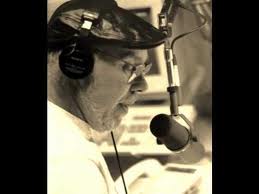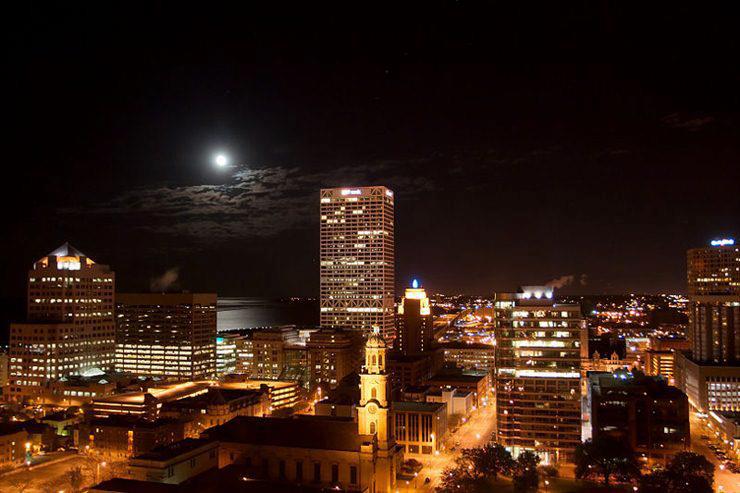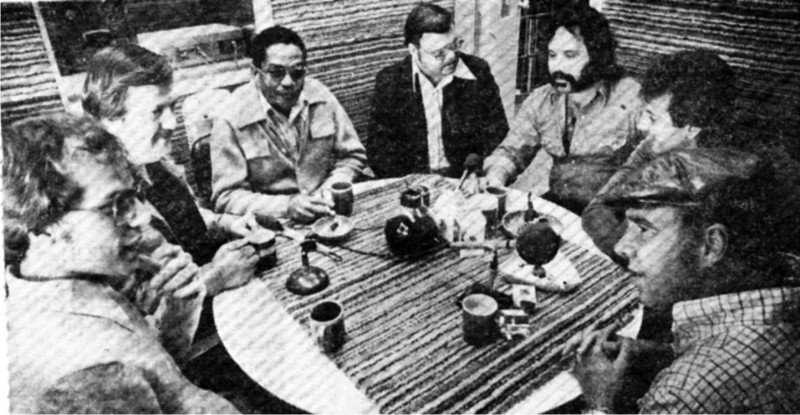
Ron Cuzner (Courtesy facebook.com
It was eleven years ago today, March 27 of 2003, when my mother called me from Milwaukee and told me Ron Cuzner had died that day, at 64. I was stunned to a Cuzner-like pregnant-pause silence. I had moved to Madison in 1989, so I lost my close connection to Ron in those pre-radio streaming years.
He had done his last Ellington “Solitude” intro, and uttered his last golden catch-phrase.
He and his jazz program The Dark Side had finally moved on to the light. 1
Cuzner was the one-of-a-kind disk jockey who exposed countless nocturnal Milwaukeeans to his beloved music on various radio venues, starting in 1968 with an “underground radio” station (along with WUWM’s Bob Reitman). His longest tenure was at the otherwise-classical music WFMR. Cuzner’s preferred time slot was midnight to sunrise. Yet hardly a vampire, he also emceed high-profile jazz concerts and ran a small jazz record store downtown.
Long-time Milwaukee Journal-Sentinel media critic Duane Dudek deemed him probably “the most singular stylist in Milwaukee radio history,” who “took a slow drawl, meticulous diction and an encyclopedic knowledge of jazz to almost every radio station in the city.” 2
In the darkness, he took his sweet time with you. Cuzner’s on-air silences involved exquisite timing between words or phrases — inserting languid grace into his delivery — the opposite of Top 40 DJ hyper-prattle. And sometimes, after the silence, the concluding phrase would be in a slightly lower, softer register: “With a song…in my heart.” He knew how such a deflation of tone could convey emotion, and sometimes pathos.
This guy from Racine would quote a humbling lyric: “They’re playing songs of love, but not for me.” He faithfully carried the torch for jazz but also another flame, for all the lonely people listening to him. Yes, his music kept him company through all those long, dark nights. But back then, he never knew really who or how many people were actually listening.
So Cuzner surely spent countless nights utterly alone until sunrise, feeling sometimes like the most forsaken bluesman. He likely suffered, at times, a bit of Naked City paranoia. He obsessively marked his name on most of his 10,000 CD cases and discs. His vast LP collection is gone, but his wife Janet donated his CDs to the library of the Wisconsin Conservatory of Music.
Cuzner’s program migrated almost as often as a restless pied piper, partly because of his dedication to a quintessentially American music that grew up flirting with commercial instincts like an illicit lover. But also radio station managers would simply pull the plug on his show — either a callow son-in-law program manager changing formats willy-nilly, or simply for tiring of Cuzner. But he understood the mercurial, ratings-obsessed radio business.
So, perhaps his style involved some self-preservation, the cool hipster carrying deep loss on his shoulders with effortless style. That announcing style had what some deemed a faintly patrician insouciance, with impeccable yet fluid and mellow diction. Somebody once niftily characterized his delivery as “an English butler who’d had a few martinis.” ( You can access podcasts of many of his shows on ITunes and on the Ron Cuzner Facebook page: https://www.facebook.com/pages/Ron-Cuzner/97979281464.
Another priceless bit, audible on the 7-11-99 podcast, is about how his grandmother “used to bake me pies and cookies and things; and she called me Butchie…” That one grew out, no doubt, of one of his signature bits: “I sincerely hope you are warm tonight, and that you are together tonight, and that your cookie jar is filled to the very brim… with the cookies of your choice, of course.”
These sugary bits had very personal resonance and poignancy, because Cuzner was a diabetic, and he died of that condition. Yes, his on-air persona was masterful shtick that grated on some people. But in retrospect, with nothing but recordings of him, the shtick is precious, in the best sense.
In person, he was laid back, soft-spoken, and yet articulate with, I think, a natural ease with diction. Unlike many of us, he took care to say what he meant as precisely and as well as possible, to honor his own thoughts. How many of us bother to do that anymore in conversation, or even when texting? Dwindling attention spans may have to do with human behavior as well as all the technology engulfing over our lives. So Cuzner ended up making a helluva lot of sense when you talked to him. Are there other people out there, who knew Ron or his show, who know what I’m talking about?
Most Cuzner fans likely have some great nocturnal memories of “The Dark Side.” If you were lucky enough not to be alone, how many times did he assist in a seduction, or in rekindled lovemaking? An indelible memory for me was the night — while half asleep in my bedroom darkness — a thundering and clarion music broke unannounced from my radio speaker. The piano style sounded familiar but I’d never heard it ringing and roaring with such hair-raising authority.
When Cuzner announced the title “Ebony Queen” I learned it was from the new album by McCoy Tyner, Sahara. It was the breakout album of Tyner’s career. After leaving Blue Note Records, he had wood-shedded for several years and signed a new contract with Milestone Records. This was his first album since fully mastering an extraordinarily muscular new technique and expressive concept, bolstered by lightning bolt left-hand bombs, and piston-powered right-hand abandon. A deeply sonorous eloquence now informed his intimate lyricism. Tyner had reach an artistic level commensurate to his former bandleader, John Coltrane. It led to the most successful period of Tyner’s career, and demonstrated how bracing, inspired jazz could have commercial power.
And it was Cuzner who turned me onto this pivotal moment in the music’s history, among others.
He also aired his own critical opinion at times. He once commented on a Down Beat magazine review which referred to pianist Mulgrew Miller, bassist George Mraz and trumpeter Lew Soloff as “also-rans.” Then he played a dazzling cut from the recording of the three musicians. At the end, he repeated their names and added, “also-rans, indeed,” his voice dripping with irony. We lived in “Henry’s city,” as he put it, referencing Milwaukee’s long-time and sometimes baronial mayor Henry Maier. But from midnight to dawn, it was Cuzner’s city.

The dark side of Ron Cuzner’s city. Courtesy facebook.com
He was a good friend to me and many members of the jazz community, especially the musicians, who often listened to Cuzner coming home from their late-night gigs. 3 We befriended each other when Ron became a customer of mine at Radio Doctors “Soul Shop” on Third and North Avenue, where I was the jazz record buyer. Later, I covered jazz for The Milwaukee Journal. Ron would eventually get me my first radio job, as a DJ at WLUM, when he left that station. 4

Ron Cuzner conducts an on air pow-wow with Milwaukee jazz musicians. Seated (from left to right) are trombonist Steve Blonien, pianist Ray Tabs, saxophonist Hattush Alexander, bassist Lee Burrows, trumpeter Tom Baker, saxophonist Warren Wiegratz and Cuzner. Courtesy rickjonesjazz.com.
I’m sure Cuzner had many highs and lows in his great career. But because he was there when we went to sleep, or when we couldn’t sleep — there for our highs and lows — he and his music became good friends for many people who never met him. 5
Ron Cuzner was, in his way, our musical consciousness. One of my personal favorite Cuznerisms was, “Twenty-two minutes after the hour. And the hour, of course …is absolutely inconsequential.” That’s funny, but it also conveys some of Cuzner’s hip, open-minded philosophy and the program’s aura of wee-hours timelessness. For years, many of us fell asleep to Cuzner, so he likely entered the corridors of our dreams, with his jazz infiltrating our alpha waves.
A Keith Jarrett album title sums up Cuzner well: The Melody At Night, With You.
Finally here’s Ron’s own farewell, a recording of his closing to his program each sunrise, accompanied by pianist Don Shirley’s gospel tune “Trilogy.”https://www.youtube.com/watch?v=UyUjoh3E3pw
Please feel free to add comments or memories of Cuzner and “The Dark Side.”
A shorter version of this article was published March 27, 2003 in OnMilwaukee.com
_______________
1 Listen here to Cuzner’s trademark show opening, Duke Ellington’s sublime “Solitude” with Cuzner piping up at about 3:30 in. http://www.youtube.com/watch?v=ZhycM79gSYs#t=24
2. http://www.jsonline.com/entertainment/tvradio/having-the-pipes-just-part-of-making-magic-on-the-on-radio-lc39ch8-134871563.html
3 Once while I was listening I heard Cuzner say, “It’s the suggestion of Kevin Lynch that you drive safely tonight. You see, his life could depend on it. A message of safety from Kevin Lynch, and from WFMR, Milwaukee.” (He borrowed many friends’ names for that bit, often after talking to them on the phone.) Then he played something for me, unrequested. It was the title tune from Dave Holland’s Conference of the Birds — music a tad more cutting edge than he normally played, but he understood my taste perfectly and nailed it.
4 That first job as a DJ was memorable, especially the night I was on the air when breaking news came over the teletype that Marvin Gaye had been murdered. What an announcement to read on the air! WLUM is an urban station and the studio phone lines lit up like small souls suffering in an earthly purgatory.
5 When Cuzner emceed jazz concerts fans had an opportunity to see the latest of his trademark caps. He even wore one with his swimming trunks when he hosted his pool parties. It was more than vanity to cover his bald head; he was quite fair-skinned, a true nocturnal creature.


You really nailed him, Kevin. I didn’t know him personally, but was a frequent listener. It was usually in my car, on my way home from a late engagement, or in my bed, in the dark, unable to sleep. Seems like yesterday, in a way. Great memory.
Thanks.
Ann
Very..very good Kevin..Ron and I were tight..time flies, still miss him
Thank you Charles. You understand what a good friend he was, probably as good as he was a DJ, eh?
KL
Thank you, Kevin, for this gorgeous eulogy to Ron Cuzner, who added a deeper dimension to being in love, out of love, lonely or just carried away by the mix of his impeccable taste in music late at night “ages ago, last night.”
Michelle
Thanks Michelle,
You sound like one of the various types of loyal listeners who Ron spoke to in his intimate language of solitude, sharing, soul and swing.
Michelle just sent me this. Lovely, thoughtful, kind and knowing.
Makes me want to read more of you. Where can I find your stuff? Good to catch a glimpse of you the other night at Wilson Center.
Is there a review available? Your thoughts?
BTW. I was never big Cuzner fan. The music was usually fine and it was
great to have it there. I liked his taste but the style was too self-reverential and affected for me. I won lots of CDs on his name-the-artist contest, which kept me up to 1:30, but not as many as the Sentinel’s Keith Spore.
I worshipped Dave Garroway, WMAQ Chicago, for about six years in the mid and late ’40s at midnight to 1:30 a.m. I listened to most of his 1160 Club jazz too many nights in my mid to late teens. Also a stylist, but a genius. Hooked me on Sarah, Ella, Woody, etc. whom he played and then replayed, pointing out things he loved the second time around.
I wrote him once asking the value of my 78 of Bob Crosby’s The Big Noise from Winnetka.
Here was his reply to an enchanted 15 year old: “Dear Old Delicate Mike. Your precious platter is worth two lonely dollars. Oversized Alohas for those incandescent phrases. Peace, Dave.”
No wonder he made it to the “Today Show,” where he was its first, and best,
anchor.”
Peace,
MD
Best
Been out of town, Mike, but thanks for reading and responding. I can’t comment on Garroway’s musical tastes having heard him only as a television personality on Today. He sounds like he was his own sort of national treasure. Giving you some wide berth to hold up Garroway as a standard, I would acknowledge Cuzner as being perhaps a peculiarly Midwestern oddity, as a personality. But he was also very good and thoughtful man with a strong vision which usually requires a certain ego, both of which were generously evident on his program.
As I grew to know the music with this great assistance, I accepted the oddities of his manner like those of a jazz soloist with an indelibly personal voice. Yes, he was self-conscious at times, perhaps proud, but I found him self-parodying as much as self-aggrandizing, because of his remarkably dry sense of humor, and the odd catch phrases, and personal anecdotes that made him into a someone you could understand and somewhat relate to — as in the anecdote about his aunt who called him “Butchie.” I related to his loneliness.
I think his style was partly his way of taking a stand for the sake of the music, of saying this is worth your attention. After all, if “Solitude” isn’t, what is? So his pregnant pauses were meant for you to open your mind up, to honor this music as you experience it as the most vital and mature indigenous art form of our own nation and people. Perhaps that sounds a little highfalutin’, but in my mind Cuzner — and especially what he contributed to Milwaukee’s culture — like a nocturnal Robin Hood of jazz, grows in stature over time rather than the reverse.
I remember that Dave Garroway signed off daily with Erroll Garner’s Misty. It was such a treat at 8:00 am.
Judy, sorry I just discovered your very cool memory of Garroway and “Misty.” Nice seeing you at Pianofest. thanks, Kevin
I’m searching for a chronology of Cuzner’s shows- approx dates start/stop, station and time-slot. I seem to remember listening to him in the late 1960’s, but that might be wrong; I CERTAINLY listened to him in the 1970’s. I even had a high-quality FM tuner set up when I went off to UW-Madison in 1974, with a big outdoor-type directional FM antenna hanging from the bedroom ceiling of my second-floor apartment, folks would stop by late at night and we would listen to “The Dark Side,” imported from Milwaukee….
Bill, Have you seen the Cuzner podcasts? here’s a link to them: Cuzner podcasts It’s the closest thing to a chronology of his shows, I know of. It is listed in the order of when those shows uploaded onto the website. But they are (almost) all broadcast-dated and the earliest ones I notice are from 1975. the latest from 2002, the year before he died. Of course this is a rich mother lode for someone who really wants to hear Cuzner again, which I’m sure you would love to — if you haven’t gotten to this site yet. Of course, if you wanted to take on the task you could reorder these in order of their broadcast. It’s hardly comprehensive but it gives people a sense of the range of time in which Ron graced our state. I might write something about him again in the future, so I’ll try to let you know, if I do.
Thanks for your interest and obvious dedication to RGC and “The Dark Side.” — Kevin L
Yep, I’ve been listening to these podcasts for a few years now. They’re fantastic.
I’m certain that Cuzner was on the air in Milwaukee prior to 1975, I know for sure I listened to him as early as 1972, but I think “The Dark Side” was on even earlier. I remember listening to WTOS in 1969, and I think I also came across Cuzner about the same time. But it was the ’60s you know… my memory might be, well, uhhh – impaired in some way.
Bill,
I’d be interested in getting clarity on Ron’s history myself, for what I might write. I thought I heard that he started actually at WUWM as did Bob Reitman. I first heard Cuzner on WTOS, probably about the same time you did. There might be some local jazz buffs or musicians who might remember some of that clearly. Perhaps Kaye Berigan. And Bob Reitman could be helpful but he’s not always responsive to messages.If you really wanted to dig, Bruce Winter at WUWM might facilitate access to possible station archives. Let me know if you find something. My E-MAIL: kelynchmi@gmail.com.
BEST,
Kevin